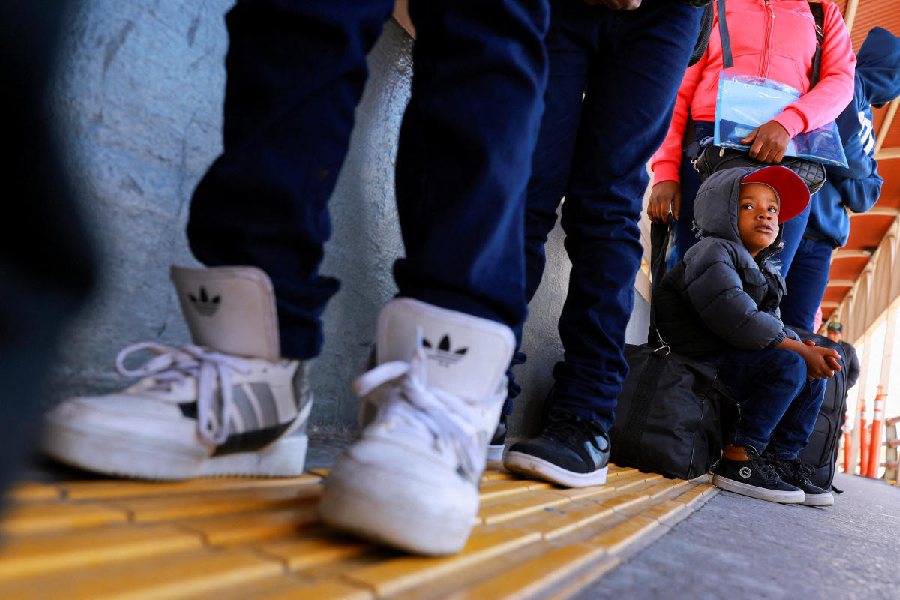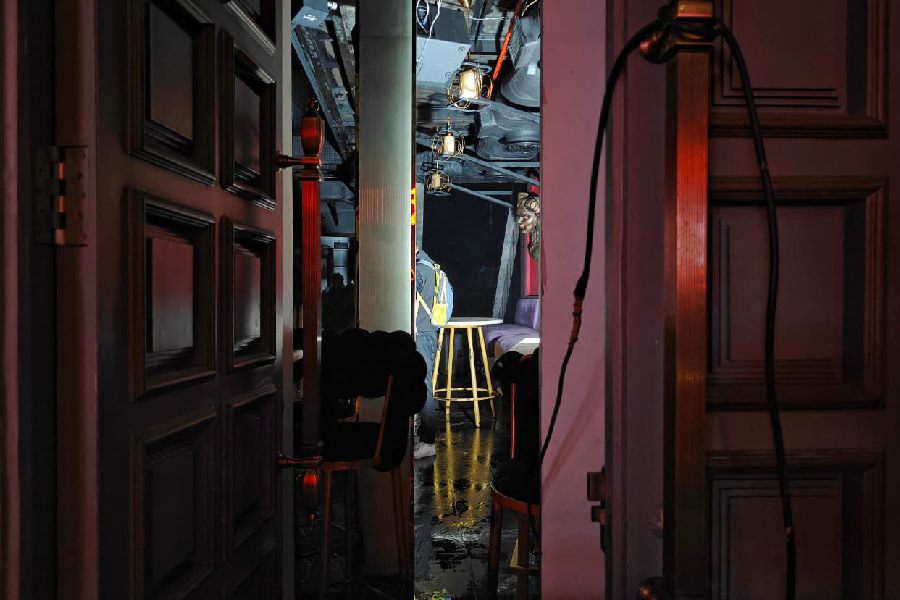 |
| Nandana Dev Sen is an actor and child rights activist, who grew up in England, India and America. |
Three weeks after I arrived in college, the phone rang at 5.30am in Cambridge, Massachusetts. “Hello…” I mumbled groggily. “Is it Mahalaya?” “NO, stupid!” roared Ma. “It’s 3PM! The Dhakis are here. Hear their drums?” I sat up, suddenly awake. Sure enough, I could hear their drums of celebration — booming in my heart, vibrating across continents, bursting through rain clouds thousands of miles away. It didn’t matter that I was on the other side of the world. My blood rushed in full tide as my heart started pounding to the beat of the drums. “Get ready,” the drums thundered through ISD crackle, “Ma Durga has arrived!”
Every Mahalaya, my grandmother dragged us out of bed in the dead of night. We huddled around the radio, grumpy and half-asleep — until that magic moment when every radio in every neighbourhood would break into exuberant prayer, to rejoice, in perfect sync, the birth of a Goddess. In a moment, I’d be utterly, impossibly awake. Dimma knew every shloka by heart, and every year Ma cried the moment Ma Durga was born.
Mahalaya would bring with it an all-new wardrobe for Pujo. I loved smelling my new clothes, although both Didi and I despised having identical tailored dresses. Same fabric, same design, mine were just smaller. Matching our frocks wasn’t fashionable at all — nor was it negotiable, at all. So, the sheer wonder of getting my first sari ever, for Pujo, was miraculous. I was nine. It was the ultimate red Banarasi, fit for a Goddess, made for a child. I was heartbroken when my gangly legs outgrew it.
Happily, I never outgrew the Pujor Mela at Triangular Park. I’d ride the wooden nagordolla obsessively every year, round after dizzying round. When I’d finally get off, the steadiness of earth seemed like an elaborate hoax. I never developed a taste for the upgraded Giant Wheel, just like I always loved the traditional protima much more than her innovative interpretations. I was once dumbstruck by a voluptuous, mega-permed Devi, her itsy-bitsy teeny-weeny zari polka dot bikini shining through her translucent pink sari. But as Dimma pointed out, Ma Durga is ever blessed with an hour-glass figure — why hide it?
 |
“Her perfect body is as mighty a weapon as those in her ten arms, see?” Such earthy words of wisdom were a surprise coming from Dimma, who usually gave us stricter lessons in moral rectitude than in female survival. She trusted me enough with my teen sweetheart to let us visit Durga thakurs all night long but she didn’t allow us alone in my room ever. So every day, he and I would walk to the monastery by the lake, to listen to the rhythmic roll of its huge flat drum. Much quieter than the Dhakis’ paean to the Goddess, yet I could hear it echo like a mantra in my first love’s heart, every gong reverberating in my ear pressed to his chest... “Do you think it’s easy to defeat a demon?” Dimma continued, eyes twinkling. “Even if you’re a Devi? A woman needs to use every advantage she has, after all!”
The only advantage I’ve ever had in defeating my peers is the fact I can eat virtually anything, having grown up addicted (and therefore immune) to Calcutta street food. Every Pujo, I loved the phuchka-eating contests I invariably won, and I loved the aloo-kabli walla at Triangular Park — an old man who travelled from Purulia every year. His aloo-kabli was so inimitable (just remembering it is literally making my mouth water right now), I kept trying to convince him to move to the city. On an unsportingly rainy Mahashtami, when his food got soaked and he got into a panic, I helped him pack up his wares and brought him home to spend the night indoors. He stayed downstairs for the week.
 |
Pujo had arrived that year with a hailstorm, unseasonable as well as ill-timed. Grounded, I was watching lightning make strange broken figures dance on the pane, like stick puppets. Suddenly Ma burst into the room, eyes like phooljhuris, dragging Didi and me into the balcony. “Sheel porchhe!” she shrieked, as we got bombarded by tiny pellets that were surprisingly painful. The three of us jumped around in pure wonder, creating our own shadow dance for the Goddess, reaching up to the sky to catch as many of the slippery little balls as we could hold, in an abundant anjali of hail. I don’t know why we felt such urgency to collect the sheel. We knew they’d disappear just as suddenly and inexplicably as they had appeared in our cupped palms, on that dark afternoon of worship.
Our house, “Bhalo-Basha,” is flanked by two Pujos. Every year there’s great suspense and speculation about their respective ‘themes.’ Earlier, we used to wonder — will the Goddess be made of bamboo, or terracotta? Will the pandals be decorated by Madhubani pat or kanthar kaaj? Now, it’s shifted to — will Durgama’s styling be inspired by Sabyasachi, or Santhali chic? Will the pandals be constructed with recycled tin or Coke bottles? Cosmetically, Pujo had to change over time — the idols, the décor, the music, the lighting — but the spell of Pujo is as magic as ever. It’s a purely visceral response — like tears, like laughter — like celebrating the year’s first raindrop, or mourning the loss of your first pet. I still get puppy-dog excited remembering the crisp cotton smell of the Pujo frocks I hated. I feel every fibre in my body come chaotically alive with the Dhaki’s first drum roll. And I still involuntarily look for that old aloo-kabli walla in every fair. The only problem is, I’ll never fit into that little Banarasi again...even though I had tried to sneak it into my college-bound suitcase years ago.
 |
A strand of its unmistakable anchal had got caught in the zip. “You’re taking your chotto Pujor sari to Harvard, Toompush? Why?” Ma asked, bewildered. “I… I just thought I might need it one day,” I mumbled unconvincingly. “I’m sure you might,” Ma said kindly. “Until then, why don’t I keep it safe for you?” She firmly took it out and locked the suitcase up, as I braced myself to say goodbye.
I had rarely seen Dimma, our own undefeatable Devi, cry. But neither she, nor I, could vanquish our tears that day. When she asked me why, I didn’t know how to tell my puritanical stoic of a grandmother how much I was going to miss her. How terrified I was of not having her in the room next to me anymore. “I’m sad because… because I’m going to miss Pujo,” I muttered. Dimma looked at me for an endless moment, her moist glance as omniscient as Durga’s Third Eye, albeit clouded-over by age. “Shut the door,” she commanded.
 |
“Remember the boy-girl stuff I told you?” I nodded reassuringly. “Forget it all,” she hissed. “They’re just words.” I stared, speechless, as my poet grandmother effortlessly dismissed the very foundation of her renown. “Life is about feelings,” she whispered. “Your life is no different than a great big Pujo…it just lasts longer than five days. It is a noisy, sparkly celebration of who you are. So enjoy every moment, every feeling, no matter what happens later. Even if you have to let go of things you love… like Visarjan, see?”
This was the matriarch who had heartlessly awakened us every Mahalaya to celebrate the birth of the perfect Goddess. That day, realising that distance would not allow her to guide me through my coming of age, Dimma had tried, with all her heart, to facilitate the inevitable birth of one (imperfect) woman. Little did she know that the birthing in question would prove to be im- possibly long and laboured — and as yet incomplete.











